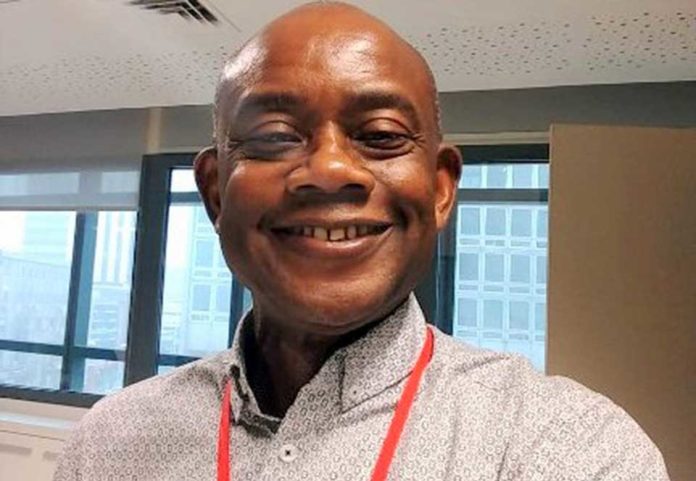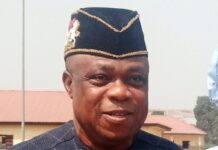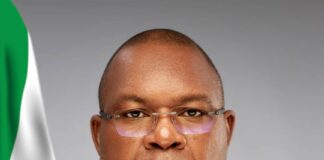He could not get admission into the university, because he did poorly in high school. He later studied French and made a First Class Honours degree from Université de Lomé.
Today, the self-confessed “rebel” is a holder of Master of Arts in Journalism, Cardiff University; holder of multiple Doctor of Philosophy (PhD) in Creative Writing in both Monash University and James Cook University.
He is also a Journalism teacher, Monash College, Melbourne, Australia; Senior Trainer, International Centre for the Advancement of Journalism, Birmingham, United States; Visiting Professor, University of Uyo; writer, editor, satirist, and author of “The Rock ‘n’ Rule years: A satirist’s view of Nigeria’s military presidency.”
Ndaeyo Uko, a former Editor of Daily Times, Guardian & Post Express Newspapers, spoke with Business & Economy Editor, Bassey Udo, during his brief vacation in Uyo recently. Excerpts:
PT: Since the last military administration in the country, you simply disappeared from the Nigerian media space. Where have you been?
NDAEYO: I have been around. I have been involved in a lot of journalism skills, ethics and anti-brown envelop pieces of training around the world as my way of giving back to the profession I love all my life. Beyond that, I also do communications consultancy for organizations and also teach in the university. At a point, I taught as a visiting Professor at the University of Uyo and at the University of Ghana.
PT: At the moment, what are you up and about?
NDAEYO: At the moment, I am a consultant to the African Development Bank in Abidjan. Every few months the bank will invite me to help in some areas of communication in their operations.
PT: Is that to suggest you have left media practice completely?
NDAEYO: Well, not exactly. Of course, teaching is media practice. I left the daily practice of journalism nearly 20 years ago. When I was in the United States, I worked for newspapers there. After that, I just found myself in teaching journalism.
PT: You made your mark in journalism in Nigeria. You were a thorn in the flesh of successive military administrations. You even wrote a book, “The Rock ‘n’ Rule years: A satirist’s view of Nigeria’s military presidency” on the Babangida military Presidency. Why did you branch out of the path that gave you a name?
NDAEYO: Family, more than anything else. The other reason was specialization. I shifted from daily news journalism.
When I joined journalism, I was in the Guardian Sunday Supplement. This was basically creative writing kind of stuff. It was not straight news. I developed the skill into a specialty when I got into academics. I took it to news reporting. I have a book that covers that.
Then, I discovered every story takes a lot of investment in time. Instead of thirty minutes to one hour, it might take 10 hours getting into the heart of it.
An accident story is not just about who, what, where, when. It is like giving a background story of what happened. That kind of reporting takes a lot of time. Before you can finish work in a day, it will be about 11 in the night. And when you have a family, you have to think of other options.
When teaching found me, I realized that is where I wanted to be. Teaching gives me more time to return to what brought me into journalism in the first place.
PT: What was it that brought you into journalism?
NDAEYO: Of course, to be a writer to impact lives and society.
PT: So, your decision to branch out of the newsroom was not a deliberate, planned action to go back to school and all that?
NDAEYO: No! Well, I did not need to go back to school. At the time I had a Master’s degree in Journalism that was okay. But, when you go into the academic world, you have to get a doctorate to survive in the western world. So, I just had to do that.
PT: From where you are today, how do you see journalism practice in Nigeria, compared to your days here?
NDAEYO: (Takes a deep breath). What I have learned is that journalism has no regional affiliation as such. Nigerian newspapers write badly. Western newspapers write badly too. But, they are a bit better, because of all kinds of factors.
For me, the issue we have is ethics, more than anything else. The other is training. These are the two things lacking in the Nigerian media.
One can tie the ethical issue to the state of the country’s economy. For example, when a journalist takes a bribe from the person he is interviewing, he becomes lower than the person he is interviewing.
A journalist who does that will not be bold to look the governor, or the president in the eyes and say: “Come on, Mr. Governor or president, how do you expect me to believe what you are telling me you did not steal the money?”
The journalist cannot say that because he has the governor or president’s money in his pocket. In that case, he can only say: “Okay, Sir”, “Yes, Sir” to whatever nonsense the governor or president says.
He puts yourself in a disadvantaged position professionally and cannot report the truth.
Second, the journalist will not have access to the external world, because we are in a globalized world now. That means everybody writes for newspapers across the globe, where you can get premium cash for quality stories.
So, if journalists think of the immediate small money, he will never get anywhere. That little brown envelop will never buy you a car, build you a house or change your economic status.
When I do pieces of training, I try to tell people: “Listen, if people give you a bribe to do a story, say no.” If they want you to do something, say: “You don’t take money you don’t work for.”
That gives you the leverage to demand for something bigger than the brown envelop. With that, you will be paid legally for what you worked for.
The second point is training. We have a cut-off point. We are no longer training. We are still thinking of the old journalism. We are not thinking of modern journalism. We have not moved on with the times. We are still fixed on hard news, who, what, where, when. That’s history.
PT: But, there is an argument that the media reflects the kind of society they are in. Does that mean the media cannot be any different from the corruption and rot in society today?
NDAEYO: True! But, should not be. The media should be leading and setting the pace for society. For example, in Nigeria, the media has always been very influential. No military coup succeeded in Nigeria that did not have a media backing. Not one.
I remember, I think it was Tafewa Balewa, who said when you read something in a Nigerian newspaper, people take it for gospel.
The media then had so much credibility. The Nigerian press is very influential than, perhaps the press anywhere in the world.
That is why even when people read junk, they believe it. That goes all the way back. The media have failed the people when they go on and follow little things and can’t get people or office holders to be accountable. It’s not about society, but about responsibility.
PT: In your time, were there not instances where your moral foundation was challenged?
NDAEYO: It’s nothing personal. The truth is journalists do not earn good money. They earn so poorly. But, that is not enough reason to abandon your responsibility.
For me, whenever I am faced with such challenges, I step aside to ask myself: Who am I? As a journalist, how do I place myself?
In one of those instances, I had an encounter with Godwin Abbe, then military governor of Akwa Ibom State. I was interviewing him, and he asked me: “Have my people taken care of you?”
And I asked him: “How do you mean?”
He replied: “Like give you lunch, or stuff.”
I said to him: “Talking about lunch, maybe I will like to buy you lunch.”
He said: “How much money do you have to buy me lunch?”
I said: “At least I earn better than an Army Colonel.”
That’s how the matter ended.
So, it’s not about the money. It’s about what your values are, and where you see yourself going.
If journalism is a passion, it is almost like a religion. You have to think a bit more of yourself. But, if it is a way of earning a living, there is a big problem.
Many of our colleagues got in there, because they wanted to earn a living. And nothing will stop them from earning their living. Whatever they need to do to realize their goal, they will do. If they ask them to bend, they will gladly do, because they must earn a living.
But, if I say I do this because I believe in it, then I will think twice about the things I accept. Then, if it does not earn me a living, big deal!
PT: In a scale of one to five. What would you say is the top quality to drive and set you apart as a journalist?
NDAEYO: Curiosity. Drive. Passion. You need to love what you are doing. You need to love grabbing the facts ahead of others, and say: “Wow! I’ve got it.”
You need to write and look back to say to yourself: “Wow! This is good. I’ve nailed it”
When I was Editor at the Guardian on the Sunday magazine, my team used to bang tables. When people hear bang tables, they know the reporter who wrote the story is saying: “This story is good. Yeees, I like it. I’ve done it.”
PT: You appear to be saying the standard of those years have left the newsrooms today. How do you bring those good old days back?
NDAEYO: Leadership. It depends on who is leading the team. When I got on the team, we had Eddie Iroh. He had very high standards. He raised us to a point that if you did anything below that it was like you were in trouble.
The job needs editors who think right. This is where I am aspiring to. I want reporters who are ambitious and want to be great. But, if you just want to earn your daily bread, then there’s a problem.
PT: Sometimes, people take serious offense if you reject an offer they consider a goodwill gesture. How do you manage such situations?
NDAEYO: In the United States, there is a clause in the Ethical Code that says, if it is like it is going to be offensive, there are certain instances you can accept a gift.
For me, I had a personal experience when I was covering elections in the Second Republic. I was in Borno State covering the Presidential candidate of one of the political parties, Waziri Ibrahim. The NPN candidate was Shetima Ali-Monguno.
He was with Ibrahim when I went to his place in Lagos and he brought a bundle of money for me. I told him: “Alhaji, sorry I don’t take a bribe.” He was shocked.
He said: “It’s not a bribe, but a gift.” I said: “I don’t need a gift, thanks.”
He said: “But, I am your elder.”
He pressed the bundle of money real hard into my hand, and it seemed like I would dishonor him. I took the money and walked up to his gateman and gave it to him. I made sure he saw me as I gave the money to the gatemen.
He was not happy. I told him, “Come on, Alhaji, you can’t be serious.”
If I took that money, I would not have been able to ask him several questions. How do you want me to have the other side of the story? What I tell people is that the hand that gives is always higher than the hand that receives.
Again, I remember my vendor when I was in Lagos. Every Christmas, they will come around and we will give them food and drinks. He will always bring me a broom. Yes, a normal broom for sweeping the floor. That’s what he can afford.
You should learn to exchange gifts with the people you work. It does not have to be expensive. The quality is important. You can’t allow somebody to be higher than you all the time.
If you meet the president or the governor, none of them is higher than you. You are human just like them. You are doing your job at your level. They are doing theirs at their level.
PT: You remind me of your encounter with the former military president, IBB? There was a time you refused to shake his hands. Are you still in touch with him?
NDAEYO: Am not. Because it was professional. It wasn’t personal. Ever! He thought, in me, he could achieve certain goals. And I thought in him I could have somebody I could reach to when I needed to and have authority.
So, it was never a personal thing. If it were personal, I would not have been fired from the Daily Times, because I could not have been fired without his approval.
PT: Fired as Editor? What happened?
NDAEYO: Well, I wrote a story considered un-Daily Times-like. Daily Times was considered at the time a government public relations newspaper.
My analogy was about a tenant in a building. I said regimes come, regimes go. Tenants come, tenants go. If a tenant breaks the window, you have to say he is wrong.
I was loyal to the state of Nigeria, not the regime in power. So, when I did a story that was balanced, I got fired, along with the Board and everybody.
PT: Were you not afraid more terrible thing than being fired could have happened to you?
NDAEYO: No, not at all. Anything that could have happened had happened already because I wrote what I thought was right. I am not afraid of anybody. I am not scared of dying, because I believe my breath is from God.
If you look at the creation of Adam, that God gave the breath, that’s why they say they give up the breath. That means, God withdraws His breath. God says: Not one hair will drop that he does not know. So, it is not possible for me to die one second before my time.
So, I do what I feel is right. I don’t value my job. If I value my job, I won’t be where I am today. I value my principle, career, profession. Journalism means people must be held accountable.
I recall when I worked in The Week. I had gone with the Publisher, Nduka Obaigbeina, to interview Colonel Halilu Akilu, then Chief Security Officer to then President, Ibrahim Babangida. That was when Dele Giwa was killed and Nigerians were asking the question: “Who killed Dele Giwa?”
We had a good interview. About the last question, I popped the question: “Colonel Akilu who killed Dele Giwa?
He said: “You killed Dele Giwa (pointing at me)”
I rephrased the question: “Colonel Akilu, Nigerians say you killed Dele Giwa. Did you kill Dele Giwa?” He was mad. And that was how the interview ended. Unfortunately, when the interview came out, that question was missing till today. Don’t ask me what happened. But, it was part of the circumstances that led to my exit.
PT: You have always been known to be fearless, bold and courageous. What’s driving you?
NDAEYO: First, Uko, in Ibibio language, means courage. I have always been a rebel. I have always challenged authority when I don’t believe in something.
In my family, my mum was very tough. But, I was the only person who could look her in the eyes and say. “Mum, I heard you did a b c. That was wrong.” And my father used to say: “Let me speak up and die.”
So, it’s just my nature. If I don’t say my mind, I won’t sleep well. That’s why I can’t work for the government. That’s why I did not accept to be the Press Secretary to Sani Abacha.
PT: In your journalism class, what do you always advise young people to expect when they want to come into journalism?
NDAEYO: Belief in the power of and principles of journalism. If you are not sure your passion can carry you, go and join the Customs or the civil service. That is where people think they make easy money.
It’s like joining the army and you are afraid of dying. Journalism is a serious business founded on strong conviction. You have to believe in it. You must be willing to say you are ready to lay down things for what you believe in.
PT: Looking back through the years, do you have any regret of any action you think you could have done differently today?
NDAEYO: It’s tough to think about it. I can’t say I could have acted differently when I was younger now that I am older.
I was young and vibrant. When I was the editor of the Daily Times, I was only 38. I believed I should aim for something, go for it, and be faithful to it.
You can lay down your life for it if you want to and be fearless and don’t let anybody look down on you. I was fortunate to have people like Ray Ekpu, Dele Giwa and others who raised journalism to a level where people can talk about the reporter as one who should be respected.
I tell you a story. I was doing a series on governance at the time for the Guardian when Babangida invited me to come and have a meeting with him in Kachia in Kaduna State.
I was waiting at the shooting range talking to Lawan Gwadabe, then the military governor of Niger State. Lawan and I were talking and laughing. Then, the late UK Bello, then the ADC to the President, came and put off my camera and said: “Reporter, the conversation is over.” He pushed me away.
I was annoyed. And I told him: “UK, you are being very rude.”
PT: He did not say anything to you?
NDAEYO: Wait for the rest of the story and the interesting twist later on. This will tell you why bribe-taking is not a good thing in journalism.
After the event, I went to the Government House. I sat down to see Gwadabe. All my colleagues were lined up there. When he walked through the corridor, they all stood up. I was still sitting there. He kept walking up and down the corridor. I suspect he did it deliberately.
My sense was that they were doing that because they knew soon the governor will call them and hand them brown envelopes. But, I did not care.
It is journalists who take bribe that behave that way. That is why a journalist should not take a bribe. If a journalist takes a bribe, he will not have the boldness to ask important questions, and his story will be one-sided. If a journalist takes bribe and still write a full story, they will kill him.
But, if you don’t take bribe and write good stories, opportunities will come for you to write and earn money that is bigger than any bribe anybody can give you. That’s how I survived, bought my car and lived my lifestyle.
PT: You mentioned a couple of names of persons you said you were lucky to have around. Any role model among them?
NDAEYO: Ray Ekpu will be the one. I used to read him a lot when I was in High School. He gave me the kick to think when I grow up I would want to be a journalist.
In Nigeria, it was not individuals, but the practice. I used to read Punch. When I joined the Guardian, after 18 months, I left for London and lived for a year and a half to read what journalism was all about and build contacts.
PT: Is that how you came into journalism?
NDAEYO: Coming to journalism was not deliberate at all. It was a terrible accident. I did poorly in High School. I was more passionate about basketball and my future. I did not pay attention to my books. That’s why I could not get into university. I went to a College of Education in Uyo.
There, someone failed me in English. I wrote a novel about me being failed unfairly. That’s why I could not go to study any other course in the university. All I had left was French. I studied and came out with First Class Honours. I went back to teach at the college.
Then, the Guardian was just coming out, and I saw a job advert. I applied. Got shortlisted. On the day we were invited, everyone wrote about their areas of specialization. But, I wrote absolutely nothing, except a letter to the editor of the Chronicle. It was never published.
I went to the streets in Shomolu and wrote a story as part of the interview. I found it in my file later on and I was told they said I had no nose for news, but I write well.
I am told it was Eddie Iroh who said, although they wanted two reporters and I could not qualify, they should create a new position for me in the Sunday Supplement. That’s how I got into journalism as a senior reporter.
PT: If any of your children were to want to become a journalist, would you give him the nod?
NDAEYO: Absolutely, I will support my kids in any career they have the passion for and believe in. I will not insist that they should be journalists. That’s their choice. I would not want them to rebel as I did.
My father was a school principal. He was in science and studied physics. He demanded that all his children should study science. I was the only person in my family who said no, am not a science person.
















